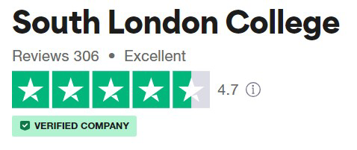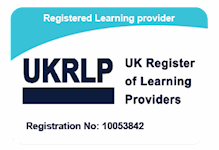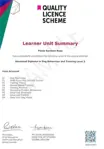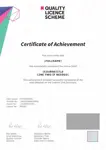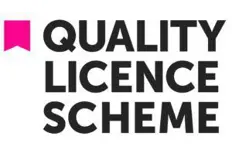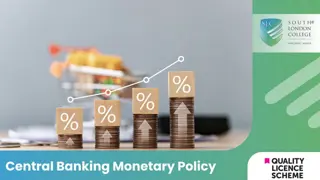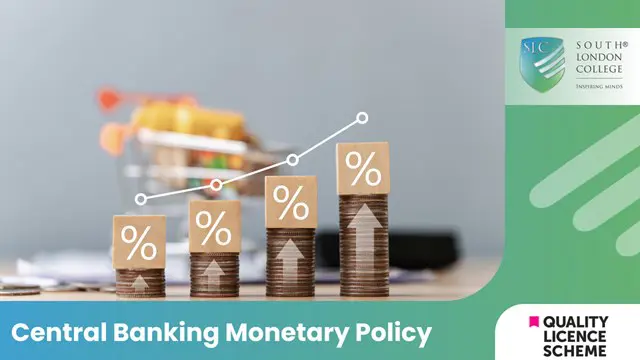
Central Banking Monetary Policy
Level 3 Diploma | Endorsed by Quality License Scheme | QLS Endorsed Certificate Included
South London College
Summary
- Certificate of completion - Free
- Exam(s) / assessment(s) is included in price
- Tutor is available to students
- TOTUM card available but not included in price What's this?
Add to basket or enquire
Overview
Diploma in Central Banking Monetary Policy - Level 3
Central banks or the currency boards are the main authorities involved with the monetary policies of a country. These monetary policies influence the money supply of a country and is an essential area of study to understand economics. If you came here wanting to learn about monetary policies and how it is implemented within an economy, this Diploma in Central Banking Monetary Policies – Level 3 is all you need! This course mainly aims at individuals aspiring to get into or already in government agencies, state banks, central banks, business consultancy and finance, provided they have a recognized qualification at level 2 or above in a related disciple.
Starting with the essence of central banks within an economy, this detailed course will then move onto explain the functions of a banker and advisor to the government. All the functions of the banking system will be relayed through this course, after which the preceding modules will enlighten you on money management, money creation and monetary policy framework.
This course will help you understand how an open economy works and how activities in an open economy affect monetary policies. You can also use this knowledge of monetary policies to make effective business decisions or to help your management. By the end of this course, you will be confident enough to successfully apply the practical knowledge on monetary policies within an organisation.
The course has been endorsed under the Quality Licence Scheme. The completion of this course alone does not lead to a regulated qualification* but may be used as evidence of knowledge and skills gained. The Learner Unit Summary may be used as evidence towards Recognition of Prior Learning if you wish to progress your studies in this subject. To this end the learning outcomes of the course have been benchmarked at Level 3 against level descriptors published by Ofqual, to indicate the depth of study and level of demand/complexity involved in successful completion by the learner.
The course itself has been designed by Imperial Learning Limited* to meet specific learners’ and/or employers’ requirements which cannot be satisfied through current regulated qualifications.
The Quality Licence Scheme endorsement involves robust and rigorous quality audits by external auditors to ensure quality is continually met. A review of courses is carried out as part of the endorsement process.
Eligible for TOTUM card - TOTUM is the #1 student discount card and app giving you access to exclusive student deals on food and fashion, tech and travel and everything in between.
*Regulated qualification refers to those qualifications that are regulated by Ofqual / CCEA / Qualification Wales
Achievement
CPD
Course media
Description
What Will I Learn?
- Gain a clear understanding and discuss the context of central banking.
- Explain in detail the function of banker and advisor to the government.
- Describe in detail the functions of the banking system and management of money.
- Gain an understanding of the framework of monetary policy.
- Discuss the models of monetary policy.
- This academic qualification will enable learners to have confidence in their skills in their field of study and apply practical knowledge in their job position.
COURSE CURRICULUM
Module 1 : Essence of Central Banking
- Essence of central banking
- Learning outcomes
- Introduction
- Milieu of the central bank: the financial system
- Context of central banking: financial stability
- Introduction
- Why financial stability?
- How is financial stability achieved domestically?
- Worldwide focus
- Balance sheet of a central bank
- Introduction
- Liabilities
- Notes and coins
- Deposits: government
- Foreign loans
- Central bank securities
- Assets
- Loans to government
- Loans to banks
- Money creation
- Functions of central banks
Module 2 : Banker and Advisor to Government
- Banker & advisor to government
- Introduction
- The interbank markets
- The bank – to – central bank interbank market
- The central bank – to – bank interbank market
- The central bank – to – bank interbank market
- Bank liquidity management
- Banker to government
- Tax and loan accounts
- Introduction
- Tax payments
- Receipts of loan issues
- Problem from perspective of central bank
- Problem from perspective of government
- Problem from perspective of banks
- The solution
- Tax payments by individuals
- Issues of government securities
- Disbursement of funds (for procurement of goods from NBPS)
- Monetary policy tool
- Public debt management
- The public debt14
- Domestic versus foreign debt
- Term structure of debt
- Relationship with monetary policy
- In - progress debt management
- Ratio to gross domestic product
- The central bank and public debt management
- Administration of exchange controls
Module 3 : Management of Money
- Management of money & banking system
- Learning outcomes
- Introduction
- Provision of internal corporate support services and systems
- Table 1: Functions of central banks
- Banker to private sector banks
- Settlement of interbank claims
- Supervision of payments system
- Lender of last resort
- Introduction
- Large/small bank problem
- Confidence and the bank run
- Currency (notes and coins) management
- Bank supervision
- Introduction
- Rationale for regulation
- Objectives of regulation
- Management of foreign assets23
- Introduction
- Why do central banks hold foreign assets?
- The desired level of reserves
- Foreign asset reserve management
- Risk
- Number of securities in portfolio
- The USD in foreign asset reserve management
- Development of the debt market
Module 4 : Money Creation & Framework of Monetary Policy
- Money Creation & framework of monetary policy
- Learning outcomes
- Introduction
- Measuring money
- Money identity: sources of money creation
- Introduction
- Example: Exports
- Example: government issues bonds
- Example: bank notes
- Money destruction
- Bank deposits and the reserve requirement
- Statutory environment
- Price stability
- Introduction
- What Is Price Stability?
- What are the benefits of price stability?
- Monetary policy accountability and transparency
- Limitations of monetary policy
- Independence of central banks
- Bibliography
Module 5 : Monetary Policy models & Transmission
- Monetary policy: models & transmission
- Introduction
- Models of monetary policy
- Introduction
- Firm required reserves model
- Interbank rate model
- Quoins of monetary policy
- Path of monetary policy: from interest to inflation
- Bibliography
Access Duration
The course will be directly delivered to you, and you have 12 months access to the online learning platform from the date you joined the course. The course is self-paced and you can complete it in stages, revisiting the lectures at any time.
Method of Assessment
In order to complete the Diploma in Central Banking Monetary Policy – Level 3 successfully, all students are required to complete a series of assignments. The completed assignments must be submitted via the online portal. Your instructor will review and evaluate your work and provide your feedback based on how well you have completed your assignments.
Certification
At the end of this course successful learners will receive a Certificate of Achievement from The Quality Licence Scheme and a Learner Unit Summary (which lists the components the learner has completed as part of the course).
Course Code: QLS-04484
Awarding body (Accreditation)
The Quality Licence Scheme has long-established reputations for providing high quality vocational qualifications across a wide range of industries. The Quality Licence Scheme combines over 180 years of expertise combined with a responsive, flexible and innovative approach to the needs of our customers.
Renowned for excellent customer service, and quality standards, The Quality Licence Scheme also offer regulated qualifications for all ages and abilities post-14; all are developed with the support of relevant stakeholders to ensure that they meet the needs and standards of employers across the UK.
Who is this course for?
- Entrepreneurs and Economists
- The course targets officials in government agencies, state banks and the central bank
- Financial Professionals
- Business Consultants
- Professional learners, undergraduate students
Requirements
- Learners should be age 19 or over, and must have a basic understanding of Maths, English, and ICT.
- A recognised qualification at level 2 or above in any discipline.
Career path
- Financial Manager - £37,803 per annum
- Financial Analyst - £30,926 per annum
- Business Consultant - £38,135 per annum
- Economist - £35,620 per annum
Questions and answers
Currently there are no Q&As for this course. Be the first to ask a question.
Certificates
Certificate of completion
Digital certificate - Included
Reviews
Currently there are no reviews for this course. Be the first to leave a review.
Legal information
This course is advertised on reed.co.uk by the Course Provider, whose terms and conditions apply. Purchases are made directly from the Course Provider, and as such, content and materials are supplied by the Course Provider directly. Reed is acting as agent and not reseller in relation to this course. Reed's only responsibility is to facilitate your payment for the course. It is your responsibility to review and agree to the Course Provider's terms and conditions and satisfy yourself as to the suitability of the course you intend to purchase. Reed will not have any responsibility for the content of the course and/or associated materials.

